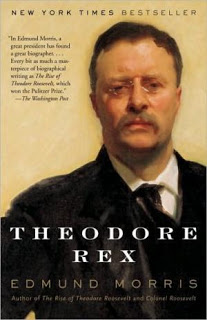
Thedore Rex
by Edmund Morris
reviewed August 2013
Sadly, I would have to file this book under the heading “Mildly Disappointed”.
Immediate Background: Author Edmund Morris pens a Pulitzer Prize biography of Theodore Roosevelt back in 1979 titled “The Rise of Theodore Roosevelt”. It chronicles the man’s life from birth until he becomes Vice President of the United States under President William McKinley. It almost seems ironic to write a biography about a president that tells nothing about a man when he is the actual president, but the book is phenomenal and well deserved of the prize. So........ I would have to file this book under the heading “Mildly Disappointed”.
President Ronald Reagan arranges for this genius of an author to write his biography. The problem is, well, Edmund Morris can never quite figure out Reagan, and, apparently isn’t given too much insight from the wealth of resources and key individuals that he has access. The biography ends up being a somewhat fictitious first-person narrative of Reagan called “Dutch” and, well, let’s just say most were highly disappointed. I would have to file this book under the heading “Mildly Disappointed”.
So after that ill-fated project, we finally get the sequel to the first Roosevelt book about 20 years after his first one set the literary world on fire. It’s not that this book is bad. No, it’s actually very good. It’s just that this particular yarn only focuses on Roosevelt’s presidency from 1901-1908. So whereas the first retrospective focused on about forty years of Roosevelt’s life, this one focuses on seven. Part of the appeal of the first book is that Roosevelt had an incredible, varied life. The man had limitless energy and accomplished enough in his lifetime that would rival as many as ten or twelve great men. He simply did it all. Well, when you’re President of the United States, even though it’s arguably the most auspicious job in the entire world, you’re somewhat limited as to what you can do. At many times, it felt as though I was reading about a stallion confined within a tight fence - just aching to break out and run. I would have to file this book under the heading “Mildly Disappointed”.
However, Roosevelt rose to the occasion of President very well. I’ve learned that any time you read a book about a truthful account of the presidency, that there will be a lot written about the down and dirty mud slinging aspects of politics, and this book is no exception. At times, the pages containing this material tended to weigh it down a bit, but since this, unfortunately, is such a large part of any politician’s life, it shouldn’t come as a surprise. Another area I found a bit cumbersome to read was the liberation of Panama. It seems as though the building of The Panama Canal could only be possible with a freed Panama, so meticulous details is paid attention to the comings and goings surrounding this event. Then when the canal starts to undergo construction, there’s almost nothing within these pages that describes the details. I was hoping for more (although in all fairness, the canal wasn’t complete until many years after Roosevelt left the office). I would have to file this book under the heading “Mildly Disappointed”.
What is well covered is the country’s obvious backwards mentality concerning issues of race. There’s a lot of that in these pages. Apparently, shortly after Roosevelt became President, he had the nerve to invite a black man (Booker T. Washington) to the White House over for dinner! What was even more “scandalous” was that Roosevelt had the nerve to have his wife at the dinner table with him. Although Roosevelt was very progressive at the time in manners of race, you wish that he could have done more, and have been a little firmer about various rights and wrongs, but, sadly to make such proclamations would be political suicide. There are several such instances within the pages about grave injustices that just make the reader angry. I would have to file this book under the heading “Mildly Disappointed”.
Another highlight was Roosevelt’s intervention in the Russian-Japanese war at the turn of the century. A lot of details are covered, and Roosevelt would, himself, receive a Nobel Peace Prize as the arbitrator between these two stubborn countries. This seemed a bit ironic, since our country had such a highly isolationist view back then. But Roosevelt pushes on and works wonders. I would have to file this book under the heading “Mildly Disappointed”.
He easily wins a second term, and despite the pleadings of the masses, he refuses to run for a third (there was no constitutional amendment limiting the President at this time in history. Also, he wasn’t really “elected” to his first term, he succeeded President McKinley very shortly into his second term after he was assassinated). There are other fun, anecdotal moments within the pages as well. I would invite you to Google the origins of the term “The White House” as well as the background of the “Teddy Bear”. I would have to file this book under the heading “Mildly Disappointed”.
I must say that this was a very pleasant read. As stated, my disappointment stems not from the author’s writing and/or research, yet simply due to the fact that this period simply wasn’t as exciting as what is covered in the first volume. You almost wish the author could have somehow combined this work with the former book making it one large biography, but that probably would have been a tad too long for most readers. Also, in 2010, there was a third (and final) biography from Morris about the man’s life after the presidency. I have a mental note to read it very soon. I would have to file this book under the heading “Mildly Disappointed”.
Go to the Next Review
Back To Main Page
E-mail your thoughts and opinions to Clem: clem@clemsmusicreviews.com